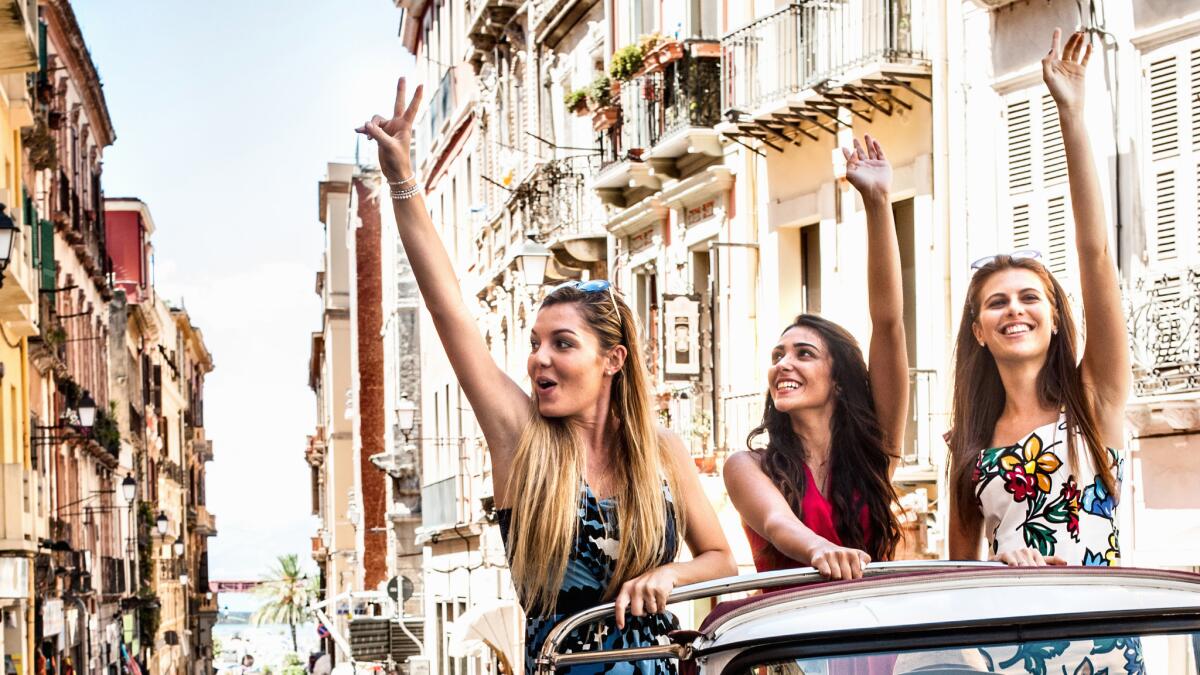Here’s what should be in your child’s wallet when studying abroad

A reader writes that she’s about to send her 19-year-old daughter to Italy for college-related studies and wonders what’s the best way to manage money and communications.
Note to parents: Coursework? Living arrangements? Logistics? Those are important concerns. But these money and staying-in-touch questions should be addressed first, I would argue, so you don’t have a kid who runs out of money in, say, Barcelona, Spain, about 220 miles and 24 hours from her final destination. That kid was me, and those were the dark ages when there were fewer options and a financial rescue took much longer.
Today, the issue isn’t scarcity or speed. It’s the multiplicity of choices. Here’s what two experts suggested as solutions.
Even if you’re not a parent, you will find information — and, I think, at least one big surprise — in here that will help you manage your money abroad.
Plus you’ll find some “nag notes” that moms and dads should reinforce.
So, to the questions.
Should a student have:
Cash?
Yes. But not a lot.
“Carrying significant amounts of cash is not a good idea,” said Kimberly Palmer, credit card and banking expert for NerdWallet.com, a personal finance site.
Cash you lose — whether you drop it or it’s taken from you — is cash that’s gone for good.
Palmer cited emergencies as one reason for cash, suggesting a stash equivalent to about $500 (but carried on one’s person only in small amounts).
Jennifer McDermott, consumer advocate for Finder.com, a personal finance comparison website, noted that in her recent travels she found that Europe “is still very much a cash society, perhaps even more so with economic uncertainty of recent times.”
“While [credit] cards are widely accepted, [she] will need to carry at least small amounts of cash when visiting regional towns, markets and for making small purchases such as an espresso or gelato,” McDermott said in an email.
If meals are not included in the student’s program, she suggested a stash of about $30 a day on top of walking-around money.
The key here is to secure your cash when you have it with you and when you leave it behind.
To carry money with you: I like under-clothing money belts and clothing (socks, T-shirts, even underwear) with hidden compartments.
Money left behind: Leave it in a safe, if there is one, and if not, use a portable safe. These bag-like portables come in different sizes, but a small one, usually embedded with steel mesh that can’t be slashed open, should protect cash and, perhaps, small electronics. It can be secured to something solid (sometimes a bed will work) with a steel cable and a lock.
Parent nag note: Remind your child to make sure he or she doesn’t leave the safe behind after a hotel stay or when heading for home.
A debit card?
Yes, for those times when cash is running low or you have unexpected expenses.
Both experts emphasized that you need to call the issuing institution to alert it to your travel plans.
Further, Palmer suggested asking whether the bank could fill you in on any unusual processes or procedures abroad.
Parent nag note: Make sure you know whether you incur fees for using a debit card and how much. They can add up. Counsel your student to use the card in safe places — a bank, not a roadside ATM.
A credit card?
Yes. You have many choices, and the good news is that with competition, many no longer charge foreign transaction fees.
The recent move in the U.S. to chipped credit cards was a halfway step. Most of our chipped cards are chip and signature cards. They still provide protection, especially from cloning.
But a signature isn’t necessarily the most secure way to verify identity.
The other variation is a chip and PIN card, which means that you have a chipped card, but it takes a PIN to complete your purchase. It is said to provide a higher standard of security.
Chip and PIN cards aren’t common in the U.S., but you can find them, including the easily obtainable Barclaycard Arrival Plus World Elite MasterCard, which I carry.
Having one isn’t imperative, unless you must pay for something at a kiosk, such as a train or subway ticket or gasoline for your rental car.
But, both experts said, before you go hunting for a PIN card, check with the issuing bank of a card you already have and see whether a PIN can be issued.
It’s impossible to say that this can be done with all cards — “It varies so much by country and card type,” Palmer said — but it’s worth asking.
It’s important to note that we’re not talking about cash-advance credit cards, which allow you to get money from ATMs. Those can be helpful in emergencies, but the fees can be high.
Parent nag note: Don’t wait until the last minute to check on a possible PIN issuance. If your card can be equipped with a PIN, that number will not be given to you over the phone, Palmer said; it most likely will be mailed to you, and we don’t mean email.
A second credit card?
Maybe. Many travelers take more than one card in case one is lost or shut down for whatever reason. A second card is a nice option, especially in an emergency.
Parent nag note: Make sure your student’s account numbers and contact information for the issuer are written down and kept secure. That might be in an encrypted file; it might be something that you, Mom and Dad, keep at home in a safe place. Make sure you monitor purchases too; tell your student to keep track of any expenditures, no blame, no shame, just sound financial practice to ensure you (or your student) is getting what he/she paid for.
One final note: We touched on this in a column called “The Five Words You Never Want to Say When You’re Paying by Credit Card in a Foreign Country”, but please instruct your child, when paying with a credit card, to ask to have the purchase charged in euros (or whatever the currency is of the country he or she is in), not dollars.
The conversion rate will be set by the bank, not by a third party, and will likely be more favorable to the buyer than the seller.
And what about staying in touch? Hold the phone. We’ll cover that next week.
Have a travel dilemma? Write to travel@latimes.com. We regret we cannot answer every inquiry.
Sign up for The Wild
We’ll help you find the best places to hike, bike and run, as well as the perfect silent spots for meditation and yoga.
You may occasionally receive promotional content from the Los Angeles Times.




